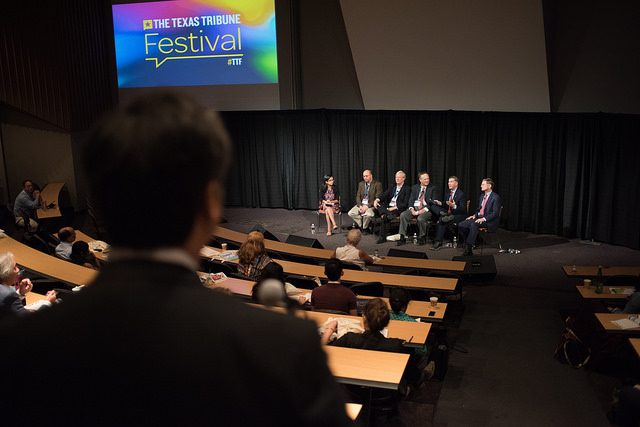Photo Credit: The Texas Tribune
The most intriguing panel discussion I attended at the Texas Tribune Festival this year was called “The Fight Over the Climate.” There were a total of six panelists: Dr. Andrew Dessler, Professor of Atmospheric Sciences at Texas A&M University; James Marston, VP for U.S. Climate and Energy at the Environmental Defense Fund; John Nielsen-Gammon, Texas State Climatologist; Bryan Shaw, Chairman of the Texas Commission on Environmental Quality; U.S. Representative Lamar Smith.
At first, the discussion was innocuous. The panelists discussed their understanding of the science of climate change and its interpretations. I found it comforting that everyone agreed the climate was warming and the cause was human activity. However, differences soon developed. Rep. Smith, who is the Chairman of the House Science, Space and Technology Committee, expressed his belief that the government should take minimal action to battle climate change. He has been repeatedly told that any legislation to curb greenhouse gas emissions would have a negligible effect on the trajectory of climate change. Therefore, he believes the government should enact legislation to encourage the private sector to develop new and better technology to solve the dilemma and avoid strengthening regulations for polluters. Rep. Smith then shared an anecdote. Once, a scientist told him that no “real” scientist would make predictions about the future. Instead, a real scientist would recognize that there are many variables and would constantly question her own conclusions and assumptions.
Later, Dr. Dressler addressed Rep. Smith’s anecdote. “And I disagree with what you said, Representative Smith. The fact is you can make predictions because it’s physics, not politics!”
As he and Rep. Smith exchanged more words, they reached the climax:
Rep. Smith: Are you a real scientist? Do you even believe in the scientific method?
Dr. Dressler: Yes! I am a scientist!
Rep. Smith: Well you sure don’t sound like it.
Rep. Smith displayed the classic confirmation bias. It is a well-known psychological phenomenon that people tend to remember or believe information that confirms their views but ignore, forget, or otherwise disbelieve information that contradicts their beliefs. This is how Rep. Smith was able to cling to a single conversation with a single scientist and use it to flatly dismiss another’s conclusions. The same conversation could similarly allow Rep. Smith to ignore an overwhelming scientific consensus about the future of the earth’s climate.
However, Rep. Smith and those like him only partly explain the country’s political climate with global warming. Environmentalists also bear some responsibility for Congress’ inability/refusal to recognize the urgency of climate change. Going as far back as the 1960s, there were scientists like Paul and Anne Ehrlich who were very vocal with their alarmist predictions. The Ehrlichs wrote The Population Bomb in 1968, which became a bestseller. Its many predictions include that the world would, in the near decades, suffer mass human starvation due to an exponentially growing population. By 2000, civilization was supposed to be on its heels. However, the opposite occurred. Technology in agriculture improved and population growth began to slow and even stagnate in developed countries as we found a way to feed a growing population in developing countries. As a result, a portion of the public was inoculated towards alarmist rhetoric and in the 1980s the environmental movement stalled in the United States.
In a similar vein, when President Richard Nixon came into office in the 1970s he did so with the support of environmentalists. In return, his Republican administration created the Environmental Protection Agency. However, Nixon quickly grew frustrated with environmentalists who he criticized as overly demanding. Despite his environmental reforms, environmental constituencies hardly paused before pushing for more. Later, he decided that the environmentalists were not the political partners he was looking for.
In sum, the politics of climate change underlying the panel’s discussion is the result of a complex series of movements and counter movements. Keeping this in mind, we see that Rep. Smith’s view contains some merit: the story of the modern era can be depicted as humanity innovating its way out of predicaments. But a more nuanced view recognizes that many technological advances followed and were facilitated by government regulating industry. Today, as our sloth-like legislature painstakingly creeps towards a consensus on the issue of climate change we simultaneously witness technology advancing exponentially. Therefore, it is not unwarranted to recognize the hero of posterity as the engineer, and not the politician. However, discounting scientific predictions can run counter to innovation, and Rep. Smith should realize that too.
Edited by: Mariam Ahmed

